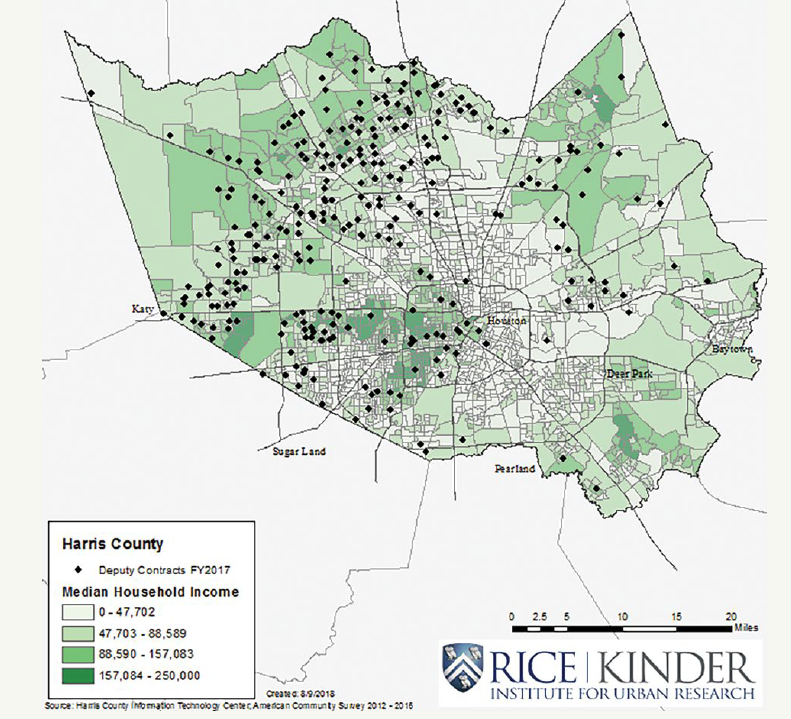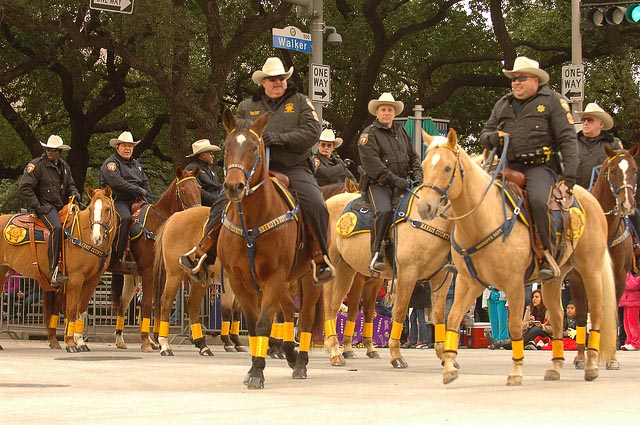More than 800 sworn law enforcement officers in Harris County patrol specific parts of the county while on duty–but they’re not paid by county taxpayers. They’re paid by municipal utility districts, homeowner associations and other organizations that contract with Harris County Constables and the Harris County Sheriff’s Office for patrol service inside their territory.
They’re part of the county’s unusual “contract deputy” program, which allows such entities to contract with the law enforcement agencies for on-duty sworn officers to patrol their areas. The program’s details are highlighted in the Kinder Institute’s new report, “Collaborations and Overlapping Services in Harris County Law Enforcement,” released this week.
It’s not uncommon for private entities to contract with off-duty police officers. But both the nature and the size of Harris County’s contract program for on-duty officers appears to be unusual. The program–which is allowed under state law–was authorized by the County Commissioners Court in the 1980s and has continued to expand ever since.
Constables have close to 200 contracts with municipal utility districts (MUDs), homeowner associations and other organizations. The Harris County Sheriff’s Office has over 100. As the map below suggests, they are concentrated mostly in two areas–the north and west side of the county, where subdivisions have never annexed to the city but MUDs play an important role, and in the affluent “arrow” inside the City of Houston that includes communities like River Oaks, the Galleria and neighborhoods around Rice University.

Overall, these contracts generate $60 million a year for the county. Almost a third of all constable deputies and 10 percent of all sheriff’s deputies work in these contracted areas.
The contracts with MUDs may have arisen from the fact that over the past 20 years the City of Houston has essentially stopped annexing newly developed areas, leaving the MUDs to perform many municipal functions. However, as the map suggests, the contract deputy program may create patrol equity issues, as the contracts both inside and outside the City of Houston tend to cover affluent areas.
Under the contract deputy program, however, the MUDs and HOAs don’t have to pay the full cost of a sworn officer. Rather, under the program’s guidelines adopted by the commissioners court, they can pay as little as 70 percent of an officer’s salary; the average contract covers about 75 percent of the cost of officers. The officers are theoretically available for general patrol duty the rest of the time, but the Kinder Institute report estimates that the county could save $22 million a year by requiring the contracts to cover the full cost of the officers.
And contrary to popular perception, the contract deputy program doesn’t cover most of the cost of either the constables or the sheriff. The county’s general fund contributes almost $300 million a year to patrols—$172 million to the sheriff (that’s 78 percent of the sheriff’s patrol budget) and $124 million to the constables (that’s 70 percent). The decision about how to split up the funds between the sheriff and the constables is made each year by the commissioners court.
The Kinder Institute report offers several options for the contract deputy program, including requiring 100 percent payment and combining sheriff and constable patrols in some way. However, the report does not make specific recommendations. It’s the Kinder Institute’s hope that this report will stimulate additional conversation about how local agencies may find new efficiencies in providing law enforcement services through better collaboration.

